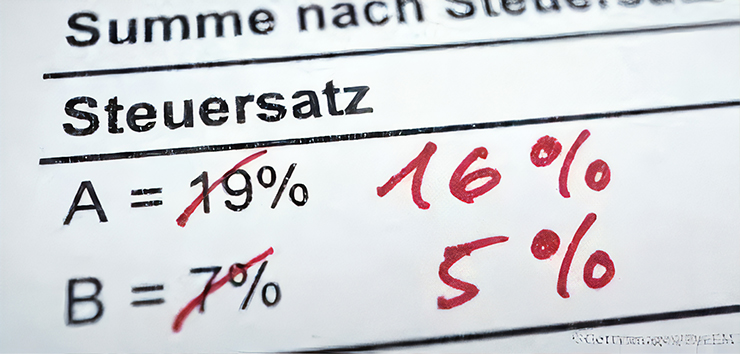The current situation due to the extraordinary COVID-19 measures may also have an impact on your value added tax (VAT) accounting. Below you will find an overview with the aspects to be considered.
Default interest
In general, interest on late payments has been waived for the period from March 20 to December 31, 2020. However, as of January 1, 2021, the usual practice of a default interest rate of 4% will apply again. However, payment holidays and appropriate payment plans will continue to be available.
COVID-19 Contributions
COVID-19 Contributions from public authorities are considered as cash flows according to Art. 18 para. 2 lit. a VAT Act. Due to the extraordinary situation, taxable persons do not have to make an input tax reduction when receiving such contributions. COVID-19 contributions are payments, interest benefits on loans, loan repayment waivers or debt forgiveness whose legal basis (law, ordinance, regulation, decision, decree, etc.) is based on COVID-19 measures and which have been paid since March 1, 2020. COVID-19 contributions are to be declared in the VAT statement under item 910 and not in item 200.
If input tax reductions have already been made as a result of receiving COVID 19 contributions, these can be reversed by means of a correction and adjustment statement.
Note for balance tax rates
When applying balance tax rates and the sudden increase of a second activity (e.g. take-away), the application of a second balance tax rate is possible.
Note on input tax reductions and subsidies
Basically, a distinction must be made between whether subsidies are object-related (for a specific construction project) or to cover an operating deficit. COVID funds have no effect on object-related subsidies. On subsidies to cover an operating deficit, the reduction of input tax is in proportion to the total revenue. Even though COVID funds do not require an input tax reduction, these amounts still count toward the total of revenues.
In addition to object-related subsidies and coverage of an operating deficit, other subsidies have also been available since August 2021. If the input tax reduction according to the ratio of subsidies to total revenue leads to a result that does not adequately take into account the weighting of the financing of expenses and investments with subsidies (measure of financing), the taxable person may apply the reduction according to total expenses. In this case, the input tax reduction on expenses and investments is made according to the ratio of the subsidy to the total expenses. For reasons of simplification, the expenses according to the income statement including depreciation are taken into account.
The most important facts at a glance:
No input tax reduction is to be made on COVID funds that are based on a government decree. Reductions already made can be corrected by means of a finalization or correction statement.
For the period from March 20, 2020 to December 31, 2020, interest on late payments has been waived. As of January 1, 2021, the default interest rate is again 4%.
A detailed review is required for rent waivers.

